DCPA NEWS CENTER
Enjoy the best stories and perspectives from the theatre world today.
Enjoy the best stories and perspectives from the theatre world today.
This Tony Award-winning pair have worked together as a dynamic musical duo since their college days — a partnership that has taken them to Broadway, Hollywood, and beyond. At the same time that they were developing Dear Evan Hansen, Benj Pasek and Justin Paul were also writing lyrics for the award-winning film La La Land, which earned them a Golden Globe® and Academy Award® for Best Original Song.
Here, the two talk about how their collaboration began and how they brought their original musical to life.
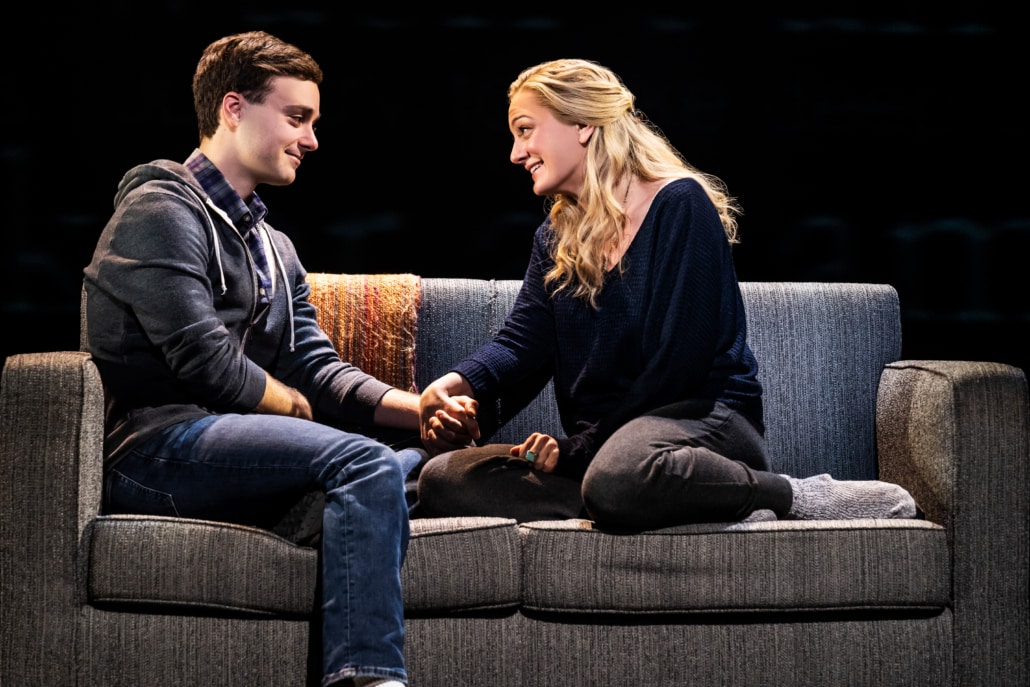
Stephen Christopher Anthony as ‘Evan Hansen’ and Jessica E. Sherman as ‘Heidi Hansen.’ Photo by Matthew Murphy. 2019
BENJ PASEK (BP): We both went to the University of Michigan for musical theater. We went there to be actors. For a lot of people who love the theater, when you’re young, acting is your way in. But halfway through school we realized maybe we’re not cut out to be performers.… After many failed attempts to get good roles in our school shows, we saw the writing on the wall and thought, “Why don’t we write our own show, and see what we can make of that?”
[As told to Metro Weekly]
JUSTIN PAUL (JP): We just started doing it for fun. We were freshmen in college when we began tinkering. It was fun to develop songs thinking from characters’ perspectives. We decided to string some of these songs together and make a song cycle our sophomore year. People were receptive. I think before we even knew what was happening we had begun a collaboration.
[As told to Metro Weekly]
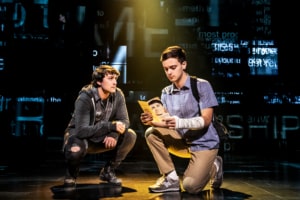
Noah Kieserman and Stephen Christopher Anthony in the North American touring company of DEAR EVAN HANSEN. Photo by Matthew Murphy, 2019
JP: I grew up in a pretty musical household. Neither of my parents are professional musicians, but they’re very, very musical. My dad and my mom would sit down and play the piano. I grew up playing a lot of music in church and singing with my parents. I started taking piano lessons when I was 7. So they were always very encouraging and they knew that I had a love for it and a knack for it.
In addition to being a performer, I always wanted to be in the pit orchestra, playing piano or percussion. I always saw myself being involved on the musical side of things in musical theater. I just figured it would be interpreting and teaching and working out other people’s music. I hadn’t really planned on it being my own music.
[As told to Metro Weekly]
BP: My mom created a bunch of kids’ albums where she would document whatever we were doing growing up and she would turn those moments into songs. She had a children’s music group in our local area of Philadelphia. So I grew up just witnessing my mom, who’s a psychologist — not a professional musician — turning life moments into song. That’s essentially what we do every day when we try to create theater. Watching her interpret things that were happening in the world, or in my world as a kid, and setting them to music — I think that really sparked an interest in writing and creating and interpreting life moments into song lyrics.
[As told to Metro Weekly]
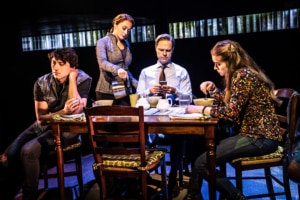
Noah Kieserman, Claire Rankin, John Hemphill, and Stephanie La Rochelle. Photo by Matthew Murphy. 2019
JP: For us, in terms of songwriting, having our stuff out online was a huge way to be able to connect with people, and musical theater fans all over the country and all over the world, in a way that couldn’t have happened 20 years ago. People knew our songs and knew our music before we ever had a show in New York City.
BP: In terms of our careers, I think we were in the right place at the right time and started writing songs at the right time. We were in college in 2005 and that was a year after Facebook began. And the year that YouTube began. And I think that really changed the way that people had access to new material.
Before that, shows needed to exist in New York — you needed at least an Off-Off-Broadway production to spread the word. What was so revolutionary about Facebook and YouTube was this democratization of who could have access to putting stuff online and being able to see it right away. So, you could be in Iowa or Singapore and you could see your content immediately without having to go to New York. And as writers, we didn’t have to go through any traditional means of getting it out there [through agents or producers] — we just put it online.
[As told to American Theatre]
BP: There was a student who was sort of anonymous. He died of a drug overdose, and it was sort of unclear whether it was intentional or not. After he passed away the student body became very, very close to him. Everybody sort of claimed him as their best friend after he died, and began to write their college essays about him, and began to talk about how amazing he was and how important he was in their lives.
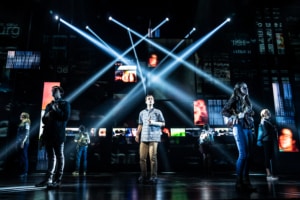
Stephen Christopher Anthony and the North American touring company of DEAR EVAN HANSEN. Photo by Matthew Murphy, 2019
When Justin and I met in college, and we began to write musicals, this moment from my high school days continued to be fascinating. We talked about exploring it in a musical. Since then, we’ve brought up a lot of other themes that we wanted to talk about — there’s sort of a need to connect, the need to be part of a community, the need to be a part of something larger than yourself, especially in the digital, isolated age that we now find ourselves in. We began to explore how we could take those themes and turn them into a musical. And that’s when the amazing Steven Levenson came into the picture and helped us to churn our ideas into an actual plot.
[As told to Metro Weekly]
JP: We noticed certain things about our culture…some things that were fascinating about the modern response to tragedy and loss. We became very interested in the world’s response to loss. And how people grieve and also communicate in the era of social media.
It made us think about our desire to connect, and our desire to be a part of something larger than ourselves. Despite our great connectedness through Facebook and Twitter and all of these social media platforms, despite being as connected as we’ve ever been as a society…
BP: We’re more isolated than ever. All of us, teenagers and adults alike.
JP: And so we wanted to use that as the backdrop of our story, but we’re telling it through the specific story of a family. This family is looking for that kind of connection, and in losing someone they love, they try to fill that void.
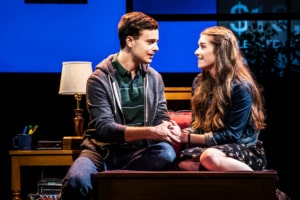
Stephen Christopher Anthony and Stephanie La Rochelle in the North American touring company of DEAR EVAN HANSEN. Photo by Matthew Murphy, 2019
JP: It’s definitely an unusual one in that he’s riddled with issues and anxieties, and with lots of self-esteem issues and a lot of other things. But I think that’s what makes him very accessible and identifiable and relatable. Hopefully everyone can go and see the show and see a little bit of Evan in themselves, and feel like they can connect with him, or at least connect with the situations that he finds himself in — he doesn’t know the right thing to say to people, or how to fit into a conversation, or how to be himself and not try to create or embellish a story about himself that is better than what he thinks his real life is. It’s a different sort of character and maybe not your typical musical theater leading man, but that’s definitely what we were hoping to write — a contemporary and relevant and accessible character.
[As told to Metro Weekly]
BP: Traditionally, in Musical Theater 101, you learn to try to write a protagonist who people like and root for on their journey. In Dear Evan Hansen, we have a protagonist who does things that are really morally questionable. It’s our jobs as writers to try to get the audience to identify with him and to support why he does what he does. We wanted to try to a create character who was more complex — and more nuanced — than maybe more traditional musical theater
characters. We’ll let critics and audiences be the judge of whether or not we have succeeded or failed.
[As told to Metro Weekly]
Original Source Material:
Rule, Doug. “Perfectly Composed: Pasek and Paul are the future of the American musical.” MetroWeekly.com, August 13, 2015.
Evans, Suzy. “You Tubesicals: The Internet Is Reinventing How Musical Theatre Is Distributed and Licensed — and Even How Shows Are Being Written.” American Theatre, Highbeam.com, July 1, 2014.
DETAILS
Dear Evan Hansen
MAY 31 – JUNE 5, 2022 • Buell Theatre
Tickets
